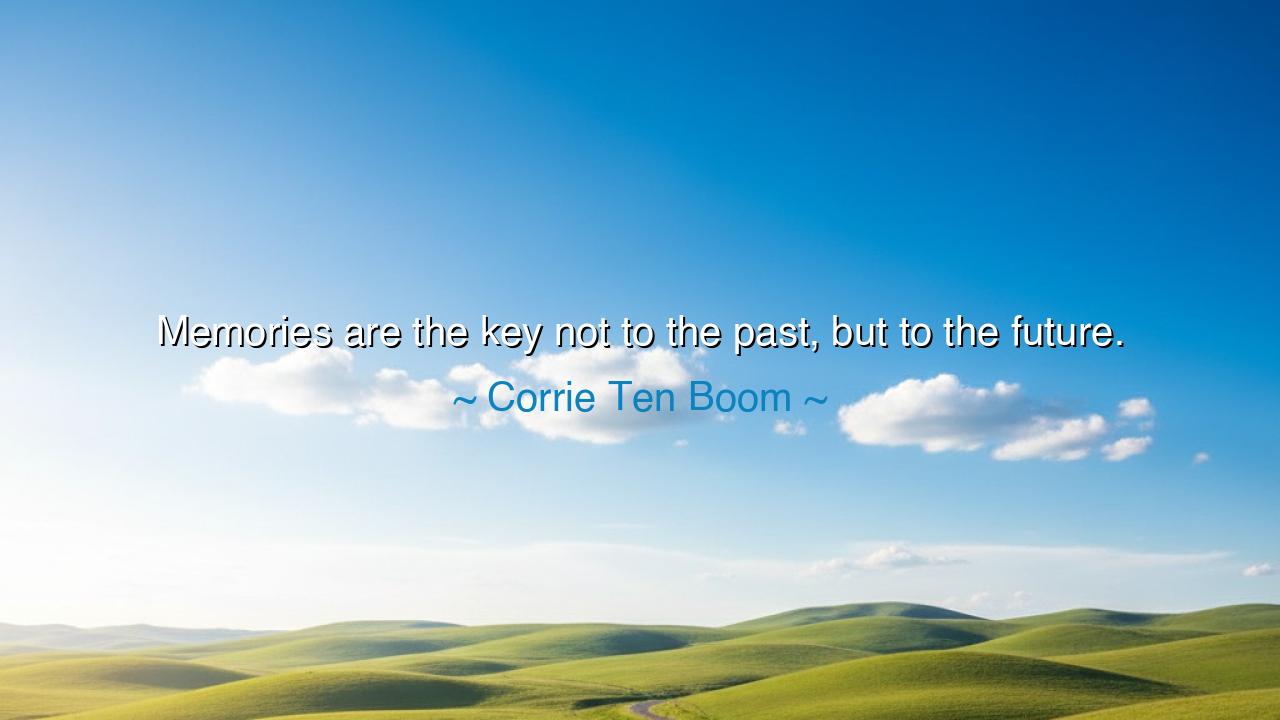
Memories are the key not to the past, but to the future.






"Memories are the key not to the past, but to the future." These powerful words by Corrie Ten Boom remind us of the profound role that our memories play in shaping the course of our future. In a world that often emphasizes moving forward without looking back, Ten Boom offers a different perspective. Rather than dwelling on past mistakes or triumphs, memories serve as a guide—a key that helps us understand how to navigate the challenges and opportunities of the days ahead. Our past is not just something to be left behind; it is a repository of lessons, experiences, and insights that inform and enlighten our future decisions and actions.
In the ancient world, memories were often seen as sacred repositories of wisdom. The Greeks, in particular, revered the role of memory in shaping identity and society. The Muses, the goddesses of art and inspiration, were said to be the embodiments of memory—givers of stories and songs that preserved the essence of human history. The epic poets like Homer carried the memories of great warriors and heroes, weaving tales that not only reflected the past but provided lessons for future generations. Homer’s Iliad and Odyssey were not mere tales of battle and adventure; they were keys to understanding the values and virtues that guided the future actions of Greek society. In this sense, the past—preserved in memory—was not a fixed moment, but an active force that continued to shape the future.
Similarly, the Romans held memory in high regard as a tool for governance and societal order. The Romans believed in the importance of collective memory, passed down through generations, as a way to honor the past and ensure the continued prosperity of the empire. Cicero, the great Roman orator, often spoke of the importance of history as a teacher for the future. By remembering the mistakes and successes of their ancestors, the Romans sought to avoid the errors of the past while building on their achievements. In this way, memory became not just a reflection of the past, but a roadmap for the future, a guiding light that allowed individuals and societies to grow in wisdom.
In the same way, Corrie Ten Boom’s words offer us a profound reflection on the power of memory to shape our lives. Ten Boom, who survived the horrors of the Holocaust and later dedicated her life to forgiveness and reconciliation, understood the importance of using memories of suffering and loss as a means of empowering the future. She did not allow the terrible memories of her past to define her negatively, but instead used them as a catalyst for hope, healing, and human connection. Her life teaches us that our memories, even those of deep pain, can serve as sources of strength, helping us to approach the future with resilience and compassion.
The lesson here is clear: memory is not merely a reflection of what has been, but a tool for understanding and shaping what is yet to come. Consider the example of Mahatma Gandhi, whose own experiences with injustice and suffering were powerful memories that fueled his mission for nonviolent resistance and social change. Gandhi’s memories of colonial oppression did not paralyze him; rather, they drove him to create a future where justice and human dignity could flourish. Just as Ten Boom used her memories to guide her post-Holocaust efforts toward forgiveness and healing, Gandhi harnessed his memories to transform his nation and the world. These individuals understood that while the past cannot be changed, it holds profound lessons that can illuminate the future.
Memories, then, are not to be feared or repressed. Instead, they are to be embraced and understood as part of our ongoing journey. Every experience, every success, every failure, and every heartache carries within it the potential for growth and transformation. Our memories are the stepping stones upon which we can build a future of purpose, compassion, and wisdom. It is in our ability to reflect on the past with clarity, to learn from its lessons, and to apply that knowledge to our future that we find the true key to a better tomorrow.
The lesson to take away from Ten Boom’s wisdom is that we must not shy away from our memories, but rather integrate them into the fabric of our lives. When we reflect on our past, we find the tools and strength to navigate the future with greater insight and understanding. Ask yourself: how can your memories—whether of joy or sorrow—serve as a guide to shape a brighter future? By embracing your past, and using it as a source of wisdom, you too can unlock the power of memory to create a future that is full of hope and purpose.






AAdministratorAdministrator
Welcome, honored guests. Please leave a comment, we will respond soon